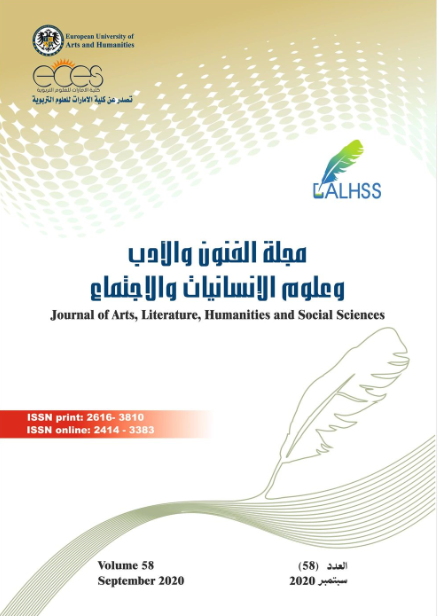Analyzing the Content of Middle School Physics Books According to Science Fiction Skills
Abstract
This research aims to analyze physics books for the intermediate stage according to science fiction skills, and to achieve this goal the researcher prepared a scale for science fiction skills and its validity was verified by presenting it to a group of experts and referees in the field of education and methods of teaching science, and in its final form it consists of (5) skills Main is (the skill of consciousness, the skill of flexibility, the skill of visualization, the skill of daydreaming, the skill of maintaining direction), and (32) sub-paragraphs emerge from it, then the researcher analyzed the physics books for the intermediate stage scheduled for the academic year 2019-2020 in light of these skills, as the number of Analyzed pages (258) pages, The units of registration, repetition and census were approved. Cooper's equation was calculated to calculate the stability factor of the analysis in agreement with external analysts and the researcher himself over time, and the results were shown using the Statistical Package for Social Sciences (SPSS - 10) and the Microsoft excel program along with the frequencies and percentage, the following: The physics textbook for the third intermediate grade He is the most - interested in science fiction skills sections, in contrast to the first medium book, which came last. Also, the percentage of the two main skills (awareness skill, and the skill of keeping direction) increased, as they had high inclusion rates compared to the rest of the science fiction skills.
References
2. الهاشمي ، عبد الرحمن وآخرون .استراتيجيات معاصرة في تدريس التربية الإسلامية (رؤية نظرية تطبيقية)،ط1،دار عالم الثقافة للنشر والتوزيع ، عمان ،2010 .
3. الشافعي ، سنية محمد : مدى تأثير الالعاب الالكترونية على تنمية الخيال العلمي لدى الاطفال ، مجلة القراءة والمعرفة ، العدد 63 الصفحات 244- 244 ، 2007
4. أبو سيف ، حسام أحمد : الخيال عبر العمر من الطفولة الى الشيخوخة ، ايتراك للنشر والتوزيع ، القاهرة ، 2005.
5. أبو سيف، حسام احمد : الأبعاد الأساسية لقدرة الخيال عبر مراحل ارتقائية مختلفة، أطروحة دكتوراه غير منشورة، كلية الآداب، جامعة المنيا، مصر، 2003.
6. الفيل ,حلمى محمد حلمى عبد العزيز: تصميم مقرر الكتروني في علم النفس قائم على مبادىء نظرية المرونة المعرفية وتأثيره في تنمية الذكاء المنظومي وخفض العبء المعرفي لدى طلاب كلية التربية النوعية جامعة الاسكندرية .كلية التربية -جامعة الاسكندرية ، 2013.
7. شاكر، عبد الحميد: نظرية التجهيز الإنساني للمعلومات بين الذاكرة الداخلية والخارجية، دار المريخ، الرياض، السعودية، 2005.
8. عبد الغفار، أنور: الأنشطة العقلية التخيلية لدى تلاميذ التعليم الأساسي، بحوث ودراسات المؤتمر (الثاني)، كلية التربية، جامعة عين شمس، القاهرة، 1994.
9. عطا، إبراهيم محمد: الخيال التربوي، ط1، كلية التربية, جامعة الفيوم، مصر، مطابع آمون، 2003 الكناني، ممدوح عبد المنعم: سيكولوجية الطفل المبدع، ط1، دار المسيرة للنشر والتوزيع والطباعة، عمان، 2011.
10. طعيمة ،رشدي احمد . تحليل المحتوى في العلوم الإنسانية ، دار الفكر العربي للنشر والتوزيع ، القاهرة ، 2004 .
11. عبد الرحمن، أنور حسين وزنكنه، عدنان حقي شهاب: الأنماط المنهجية وتطبيقاتها في العلوم الإنسانية والتطبيقية، دار الكتب، بغداد، 2007.
12. الإمام ، مصطفى محمود وآخرون . التقويم والقياس ، ط1 ،مطبعة دار الحكمة ، بغداد ، 1990 .
References
1. Al-Saadi, Fatima Diab: The effect of lateral thinking strategies on improving cognitive flexibility among university students, unpublished PhD thesis, College of Education for Girls, University of Baghdad, 2008.
2. Al-Hashemi, Abdul-Rahman and others. Contemporary Strategies in Teaching Islamic Education (An Applied Theory Vision), 1st Edition, House of the Culture World for Publishing and Distribution, Amman, 2010.
3. Al-Shafei, Sania Muhammad: The Impact of Electronic Games on the Development of Science Fiction among Children, Reading and Knowledge Magazine, Issue 63, Pages 244-244, 2007
4. Abu Seif, Hossam Ahmed: Imagination through a lifetime from childhood to old age, Itrac for Publishing and Distribution, Cairo, 2005.
5. Abu Seif, Hossam Ahmed: The Basic Dimensions of Imagination's Power Through Different Progressive Phases, Unpublished PhD thesis, Faculty of Arts, Minia University, Egypt, 2003.
6. El-Feel, Helmy Mohamed Helmy Abdel Aziz: Designing an electronic course in psychology based on the principles of the theory of cognitive flexibility and its effect on developing systemic intelligence and reducing the cognitive burden among students of the Faculty of Specific Education, Alexandria University, Faculty of Education - Alexandria University, 2013.
7. Shaker, Abdul-Hamid: The Theory of Human Information Processing between Internal and External Memory, House of Mars, Riyadh, Saudi Arabia, 2005.
8. Abdel Ghaffar, Anwar: The imaginative mental activities among students of basic education, research and studies of the (second) conference, Faculty of Education, Ain Shams University, Cairo, 1994.
9. Atta, Ibrahim Mohamed: Educational Imagination, 1st Edition, Faculty of Education, Fayoum University, Egypt, Amoun Press, 2003 Al-Kanani, Mamdouh Abdel-Moneim: The Psychology of the Creative Child, 1st Edition, Dar Al-Masirah for Publishing, Distribution and Printing, Amman, 2011.
10. Toaima, Rushdie Ahmed. Content Analysis in the Humanities, Arab Thought House for Publishing and Distribution, Cairo, 2004.
11. Abd al-Rahman, Anwar Hussain and Zankana, Adnan Haqqi Shihab: Methodological patterns and their applications in the human and applied sciences, Dar Al-Kutub, Baghdad, 2007.
12. Imam, Mustafa Mahmoud and others. Evaluation and Measurement, 1st Edition, Dar Al-Hikma Press, Baghdad, 1990.



